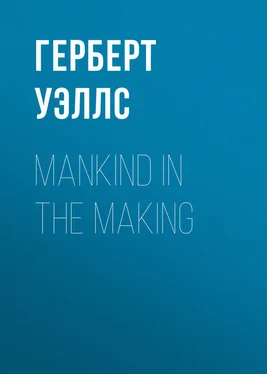Герберт Уэллс - Mankind in the Making
Здесь есть возможность читать онлайн «Герберт Уэллс - Mankind in the Making» — ознакомительный отрывок электронной книги совершенно бесплатно, а после прочтения отрывка купить полную версию. В некоторых случаях можно слушать аудио, скачать через торрент в формате fb2 и присутствует краткое содержание. Жанр: Философия, foreign_prose, на английском языке. Описание произведения, (предисловие) а так же отзывы посетителей доступны на портале библиотеки ЛибКат.
- Название:Mankind in the Making
- Автор:
- Жанр:
- Год:неизвестен
- ISBN:нет данных
- Рейтинг книги:4 / 5. Голосов: 1
-
Избранное:Добавить в избранное
- Отзывы:
-
Ваша оценка:
- 80
- 1
- 2
- 3
- 4
- 5
Mankind in the Making: краткое содержание, описание и аннотация
Предлагаем к чтению аннотацию, описание, краткое содержание или предисловие (зависит от того, что написал сам автор книги «Mankind in the Making»). Если вы не нашли необходимую информацию о книге — напишите в комментариях, мы постараемся отыскать её.
Mankind in the Making — читать онлайн ознакомительный отрывок
Ниже представлен текст книги, разбитый по страницам. Система сохранения места последней прочитанной страницы, позволяет с удобством читать онлайн бесплатно книгу «Mankind in the Making», без необходимости каждый раз заново искать на чём Вы остановились. Поставьте закладку, и сможете в любой момент перейти на страницу, на которой закончили чтение.
Интервал:
Закладка:
To begin these speculations in logical order we must begin at the birth point, we must begin by asking how much may we hope, now or at a later time, to improve the supply of that raw material which is perpetually dumped upon our hands? Can we raise, and if so, what can we do to raise the quality of the average birth?
This speculation is as old at least as Plato, and as living as the seven or eight babies born into the English-speaking world since the reader began this Paper. The conclusion that if we could prevent or discourage the inferior sorts of people from having children, and if we could stimulate and encourage the superior sorts to increase and multiply, we should raise the general standard of the race, is so simple, so obvious, that in every age I suppose there have been voices asking in amazement, why the thing is not done? It is so usual to answer that it is not done on account of popular ignorance, public stupidity, religious prejudice or superstition, that I shall not apologize for giving some little space here to the suggestion that in reality it is not done for quite a different reason.
We blame the popular mind overmuch. Earnest but imperfect men, with honest and reasonable but imperfect proposals for bettering the world, are all too apt to raise this bitter cry of popular stupidity, of the sheep-like quality of common men. An unjustifiable persuasion of moral and intellectual superiority is one of the last infirmities of innovating minds. We may be right, but we must be provably, demonstrably and overpoweringly right before we are justified in calling the dissentient a fool. I am one of those who believe firmly in the invincible nature of truth, but a truth that is badly put is not a truth, but an infertile hybrid lie. Before we men of the study blame the general body of people for remaining unaffected by reforming proposals of an almost obvious advantage, it would be well if we were to change our standpoint and examine our machinery at the point of application. A rock-drilling machine may be excellently invented and in the most perfect order except for a want of hardness in the drill, and yet there will remain an unpierced rock as obdurate as the general public to so many of our innovations.
I believe that if a canvass of the entire civilized world were put to the vote in this matter, the proposition that it is desirable that the better sort of people should intermarry and have plentiful children, and that the inferior sort of people should abstain from multiplication, would be carried by an overwhelming majority. They might disagree with Plato’s methods, [Footnote: The Republic , Bk. V.] but they would certainly agree to his principle. And that this is not a popular error Mr. Francis Galton has shown. He has devoted a very large amount of energy and capacity to the vivid and convincing presentation of this idea, and to its courageous propagation. His Huxley Lecture to the Anthropological Institute in 1901 [Footnote: Nature , vol. lxiv. p. 659.] puts the whole matter as vividly as it ever can be put. He classifies humanity about their average in classes which he indicates by the letters R S T U V rising above the average and r s t u v falling below, and he saturates the whole business in quantitative colour. Indeed, Mr. Galton has drawn up certain definite proposals. He has suggested that “noble families” should collect “fine specimens of humanity” around them, employing these fine specimens in menial occupations of a light and comfortable sort, that will leave a sufficient portion of their energies free for the multiplication of their superior type. “Promising young couples” might be given “healthy and convenient houses at low rentals,” he suggests, and no doubt it could be contrived that they should pay their rent partly or entirely per stone of family annually produced. And he has also proposed that “diplomas” should be granted to young men and women of high class – big S and upward – and that they should be encouraged to intermarry young. A scheme of “dowries” for diploma holders would obviously be the simplest thing in the world. And only the rules for identifying your great S T U and V in adolescence, are wanting from the symmetrical completeness of his really very noble-spirited and high-class scheme.
At a more popular level Mrs. Victoria Woodhull Martin has battled bravely in the cause of the same foregone conclusion. The work of telling the world what it knows to be true will never want self-sacrificing workers. The Humanitarian was her monthly organ of propaganda. Within its cover, which presented a luminiferous stark ideal of exemplary muscularity, popular preachers, popular bishops, and popular anthropologists vied with titled ladies of liberal outlook in the service of this conception. There was much therein about the Rapid Multiplication of the Unfit, a phrase never properly explained, and I must confess that the transitory presence of this instructive little magazine in my house, month after month (it is now, unhappily, dead), did much to direct my attention to the gaps and difficulties that intervene between the general proposition and its practical application by sober and honest men. One took it up and asked time after time, “Why should there be this queer flavour of absurdity and pretentiousness about the thing?” Before the Humanitarian period I was entirely in agreement with the Humanitarian’s cause. It seemed to me then that to prevent the multiplication of people below a certain standard, and to encourage the multiplication of exceptionally superior people, was the only real and permanent way of mending the ills of the world. I think that still. In that way man has risen from the beasts, and in that way men will rise to be over-men. In those days I asked in amazement why this thing was not done, and talked the usual nonsense about the obduracy and stupidity of the world. It is only after a considerable amount of thought and inquiry that I am beginning to understand why for many generations, perhaps, nothing of the sort can possibly be done except in the most marginal and tentative manner.
If to-morrow the whole world were to sign an unanimous round-robin to Mr. Francis Galton and Mrs. Victoria Woodhull Martin, admitting absolutely their leading argument that it is absurd to breed our horses and sheep and improve the stock of our pigs and fowls, while we leave humanity to mate in the most heedless manner, and if, further, the whole world, promising obedience, were to ask these two to gather together a consultative committee, draw up a scheme of rules, and start forthwith upon the great work of improving the human stock as fast as it can be done, if it undertook that marriages should no longer be made in heaven or earth, but only under licence from that committee, I venture to think that, after a very brief epoch of fluctuating legislation, this committee, except for an extremely short list of absolute prohibitions, would decide to leave matters almost exactly as they are now; it would restore love and private preference to their ancient authority and freedom, at the utmost it would offer some greatly qualified advice, and so released, it would turn its attention to those flaws and gaps in our knowledge that at present render these regulations no more than a theory and a dream.
The first difficulty these theorists ignore is this: we are, as a matter of fact, not a bit clear what points to breed for and what points to breed out.
The analogy with the breeder of cattle is a very misleading one. He has a very simple ideal, to which he directs the entire pairing of his stock. He breeds for beef, he breeds for calves and milk, he breeds for a homogeneous docile herd. Towards that ideal he goes simply and directly, slaughtering and sparing, regardless entirely of any divergent variation that may arise beneath his control. A young calf with an incipient sense of humour, with a bright and inquiring disposition, with a gift for athleticism or a quaintly-marked hide, has no sort of chance with him at all on that account. He can throw these proffered gifts of nature aside without hesitation. Which is just what our theoretical breeders of humanity cannot venture to do. They do not want a homogeneous race in the future at all. They want a rich interplay of free, strong, and varied personalities, and that alters the nature of the problem absolutely.
Читать дальшеИнтервал:
Закладка:
Похожие книги на «Mankind in the Making»
Представляем Вашему вниманию похожие книги на «Mankind in the Making» списком для выбора. Мы отобрали схожую по названию и смыслу литературу в надежде предоставить читателям больше вариантов отыскать новые, интересные, ещё непрочитанные произведения.
Обсуждение, отзывы о книге «Mankind in the Making» и просто собственные мнения читателей. Оставьте ваши комментарии, напишите, что Вы думаете о произведении, его смысле или главных героях. Укажите что конкретно понравилось, а что нет, и почему Вы так считаете.












